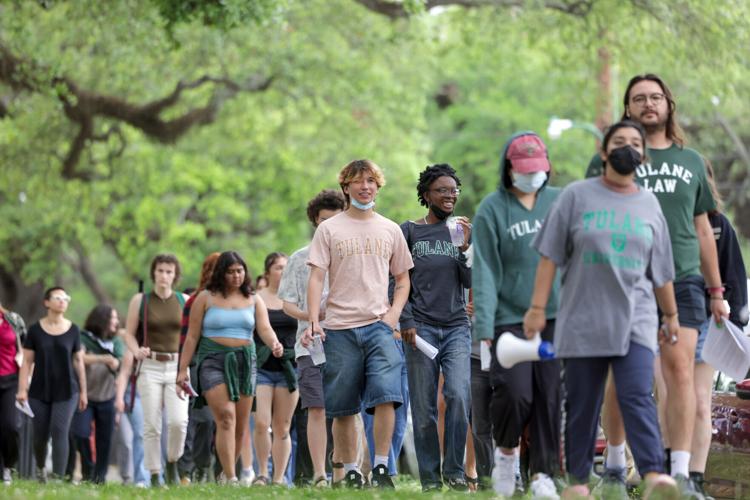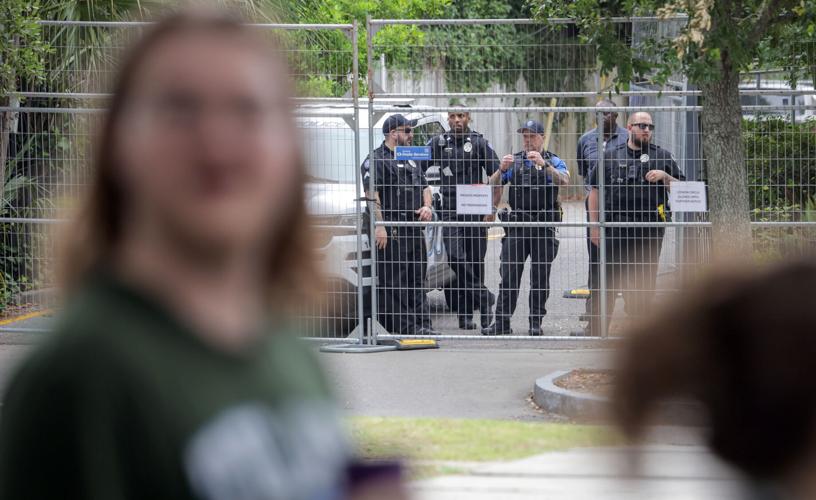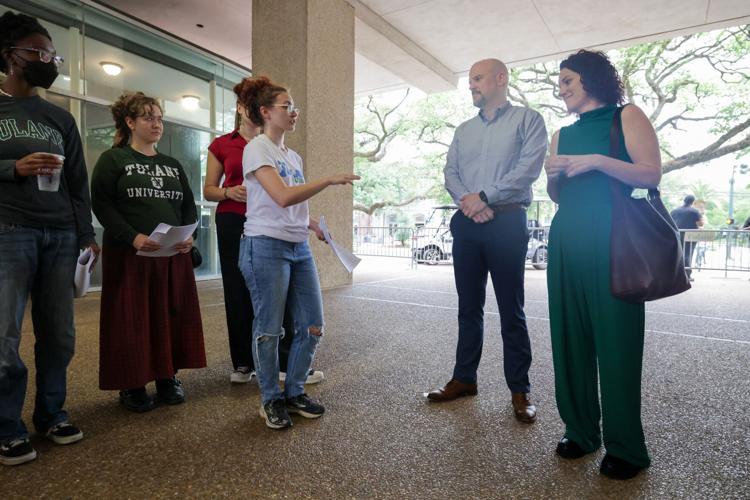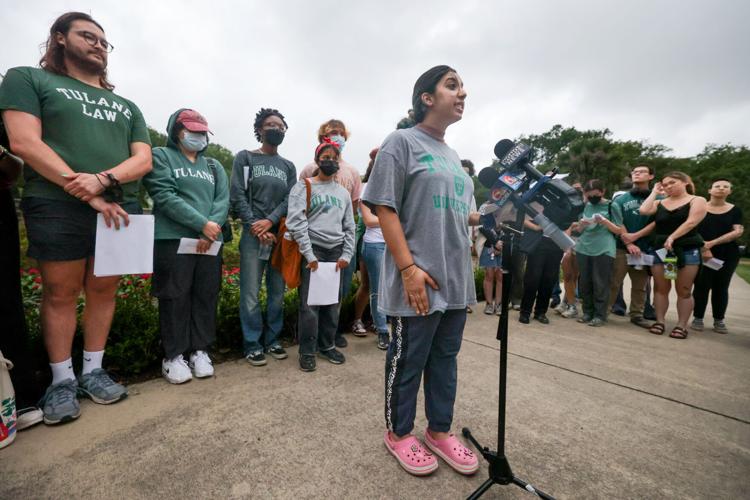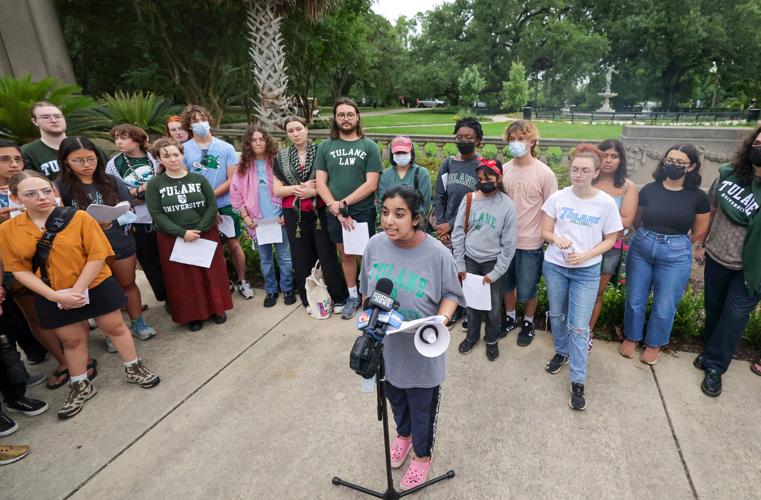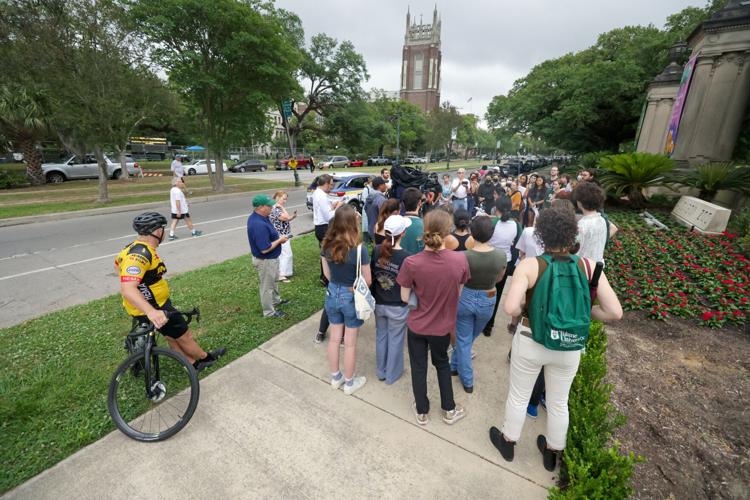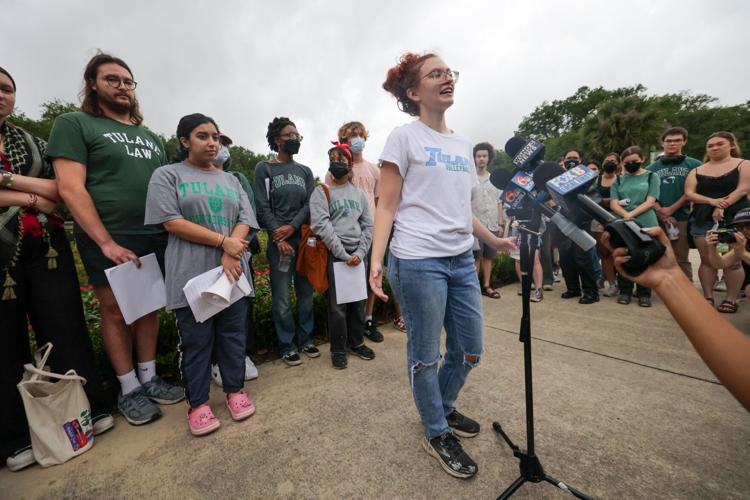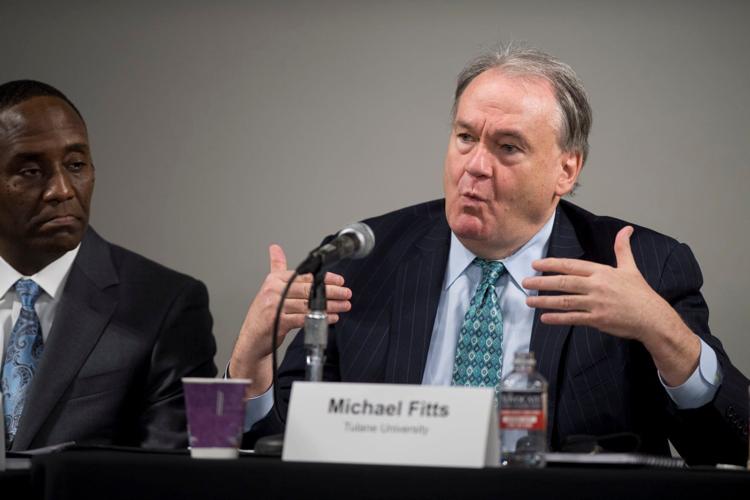Two days after police cleared a pro-Palestinian encampment from Tulane University's campus, students and faculty members delivered signed letters on Friday to university leadership demanding suspended students be reinstated, prompting Tulane President Michael Fitts to issue an extended defense of his administration's actions.
During a news conference on St. Charles Avenue Friday morning, some of the 852 students who had signed the letter criticized what they considered a disproportionate police response to their First Amendment rights when Tulane and law-enforcement authorities on Wednesday cleared the small encampment from the private campus. Police arrested 14 people, including five students who attended either Tulane or Loyola University.

More than 800 Tulane University students signed a letter making demands of their school that included divestment from Israel, condemnation of Israel's military actions and protection for suspended staff and students and delivered it to officials Friday morning
Some 200 Tulane faculty issued their own letter in support of students. Published on the website of The Tulane Hullabaloo, the school's newspaper, the faculty members said they "oppose Tulane's escalatory actions in the face of peaceful protest" and called for the administration to drop the suspensions.
Other demands of the students included that Tulane divest from Israeli fuel and technology companies, condemn Israel's military actions and provide protection for suspended staff and students.
Tulane, which has roughly 7,000 undergraduate students and 1,200 faculty members, has been roiled in recent days by the demonstrations, which echoed much larger and sometimes violent protests that have taken place on college campuses across the U.S.

Michael Fitts, right, president of Tulane University talks as business leaders from New Orleans gather for Economic Outlook Summit 2020 hosted by The Times-Picayune | New Orleans Advocate on Thursday, January 9, 2020. Next to him is David Ellis, CEO of Entergy New Orleans.
Fitts and other administration officials say they have tried to strike a balance between honoring the First Amendment rights of pro-Palestinian protesters while supporting students who say they've felt threatened and who have demanded an end to any unlawful behavior.
In a statement addressed to the "Tulane Community," Fitts said Friday that university leadership met with students and faculty who presented the letters. According to the statement, the pro-Palestinian protest on Monday was not approved for campus because it was expected to include people not affiliated with Tulane and that the encampment "was directly counter to our rules and unacceptable."
Fitts said that "deeply disturbing behavior" during the demonstration, including antisemitic and Islamophobic language, was reported to have come from protesters and counter protesters, and tires, chains and pallets that arrived at the encampment "created the potential for real danger."
"The decision to clear the encampment was informed" by those factors and others, the letter said.
However, students said their protest was peaceful until police showed up. They rejected the notion that outside agitators incited the arrests.
"This was a nonviolent demonstration by students on our own campus," said Silas Gillett, a Jewish sophomore at Tulane. "I was at the encampment and uncertain whether I or my friends would live until the morning."
Sania Islam, a Tulane undergraduate from New Orleans who spoke at the press conference on Friday, said, "We see our school's complicity in genocide as incompatible with its values," referring to its investments and other links to Israel.
Leaders of some Jewish student groups at Tulane, which has a large Jewish population, have spoken out against the encampment and what they've said was a threatening atmosphere in recent months for Jewish students.

Sania Islam speaks on Friday, May 3, 2024 after more than than 800 Tulane University students signed a letter making demands of their school that included divestment from Israel, condemnation of Israel's military actions and protection for suspended staff and students.
“I’ve had dozens of students reach out to me in fear,” said Yasmeen Ohebsion on Tuesday, when the encampment had been established on the Gibson lawn. A Tulane senior and president of the Movement to Address Antisemitism, Ohebsion has raised concerns about antisemitism on campus, including during Congressional hearings.
Jewish groups have also sent letters to Tulane officials. On Tuesday, Nathaniel Miller, president of the Tulane Israel Public Affairs Committee, which promotes ties between the U.S. and Israel, sent an open letter to the administration that said some faculty and staff were "dismayed and disgusted" by the school's failure to contain the protest.
That letter was signed by dozens of students and alumni.
The situation at Tulane is "still incredibly tense," according to Joscelyn Caldwell, a sophomore at Tulane who was at the press conference Friday. She noted that the fault lines on campus aren't always clear-cut, and that the group of pro-Palestinian protesters present at Friday's media briefing included some Jewish students.
"I know Jewish people who signed our letter that asked me to remove their names because they were being harassed by members of the student body," said Caldwell. "The Jewish perspectives are incredibly important."
Pro-Palestinian protesters set up encampments on Tulane's campus Monday and remained there through Tuesday night. School officials first worked to contain the size of the encampment, but early Wednesday morning, officers from Tulane, the New Orleans Police Department and Louisiana State Police cleared it away.

Tulane University sophomore Joscelyn Caldwell speaks on Friday, May 3, 2024 after more than than 800 Tulane University students signed a letter making demands of their school that included divestment from Israel, condemnation of Israel's military actions and protection for suspended staff and students.
The encampment was the local manifestation of pro-Palestinian demonstrations that have taken hold at universities nationwide.
From Columbia University to UCLA, police have arrested more than 2,100 people during pro-Palestinian protests on campuses across the U.S. in recent weeks, sometimes using riot gear, tactical vehicles and flash-bang devices to clear tent encampments and occupied buildings.
Louisiana State Police donned riot gear at Tulane and forced demonstrators off the campus and the nearby St. Charles Avenue neutral ground. No major injuries were reported. The people arrested during the closure were all released on their own recognizance by Orleans Parish Criminal District Judge Nandi Campbell before they appeared in Magistrate Court.
Pro-Palestinian demonstrations have occurred across New Orleans in recent months, and on Thursday, some Tulane students were present at the New Orleans City Council meeting, where pro-Palestinian advocates urged council members to publicly support students who demonstrated at Tulane and to denounce the university’s response.
Wearing face masks and keffiyehs, holding signs reading “Palestine is a local issue,” “No SWAT for student protesters” and “Divest from war criminals,” about 50 protesters commented on agenda items tangentially related to their causes, including one that funded bulletproof vests for police officers.
Another pro-Palestinian encampment, which was in place for several hours Sunday afternoon in Jackson Square, was dismantled by NOPD and Louisiana State Police in a clash that saw five NOPD officers hospitalized and 12 protesters sent to jail. At least two of them sustained injuries they said came from police.
New Orleans' independent police monitor is tracking the NOPD's investigation of uses of force connected with that incident.
The Associated Press, Patrick Wall and Marie Fazio contributed to this report.


